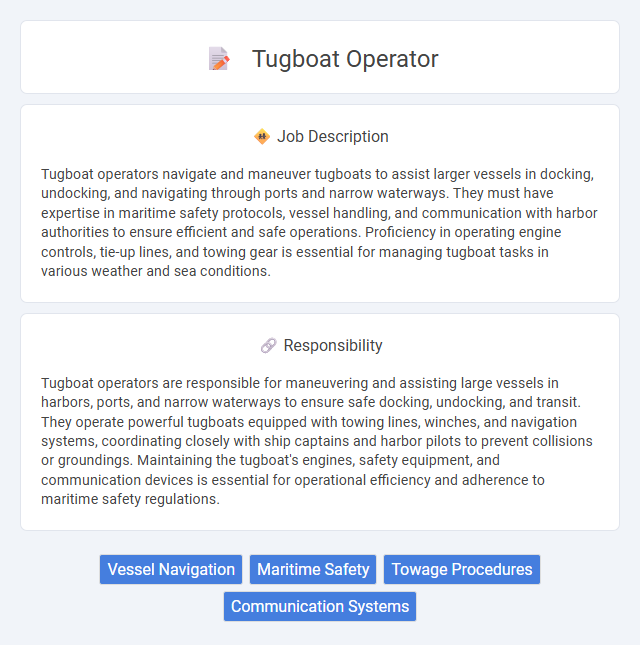
Tugboat operators navigate and maneuver tugboats to assist larger vessels in docking, undocking, and navigating through ports and narrow waterways. They must have expertise in maritime safety protocols, vessel handling, and communication with harbor authorities to ensure efficient and safe operations. Proficiency in operating engine controls, tie-up lines, and towing gear is essential for managing tugboat tasks in various weather and sea conditions.
Individuals with strong physical stamina and good spatial awareness are likely to be suitable for a tugboat operator position due to the demanding nature of maneuvering heavy vessels in challenging marine environments. Those who can remain calm under pressure and have excellent communication skills may find this role aligns well with their abilities. It is probable that candidates prone to motion sickness or lacking attention to detail might struggle with the responsibilities of this job.
Qualification
Tugboat operators must possess a valid operator's license and often require certification through the U.S. Coast Guard or equivalent maritime authority, ensuring compliance with safety standards and navigational regulations. Proficiency in ship handling, maritime communication protocols, and knowledge of local waterways are essential qualifications for effective tugboat operation. Operators typically undergo rigorous training in emergency procedures, engine mechanics, and environmental regulations to ensure safe and efficient vessel maneuvering.
Responsibility
Tugboat operators are responsible for maneuvering and assisting large vessels in harbors, ports, and narrow waterways to ensure safe docking, undocking, and transit. They operate powerful tugboats equipped with towing lines, winches, and navigation systems, coordinating closely with ship captains and harbor pilots to prevent collisions or groundings. Maintaining the tugboat's engines, safety equipment, and communication devices is essential for operational efficiency and adherence to maritime safety regulations.
Benefit
Tugboat Operator roles likely offer competitive benefits, including comprehensive health insurance and retirement plans, contributing to long-term financial security. Opportunities for overtime pay and hazard pay could increase overall earnings due to the demanding nature of the job. Access to specialized training and certifications may provide career advancement potential and skill development.
Challenge
Tugboat operator roles likely entail navigating tight harbor spaces with precision, demanding strong situational awareness and expert vessel handling skills. Operators probably face unpredictable weather and varying water currents that increase operational complexity and require quick adaptability. The necessity to coordinate with multiple marine vessels and port authorities suggests challenges in communication and timing crucial for safe and efficient maneuvers.
Career Advancement
Tugboat operators gain valuable experience navigating complex waterways and handling large vessels, which can lead to advanced roles such as harbor pilot or marine operations manager. Mastery of maritime safety protocols and certification upgrades enhance career mobility within the shipping and offshore industries. Opportunities for specialization in offshore towing, port management, or vessel logistics further support professional growth and higher earning potential.
Key Terms
Vessel Navigation
Tugboat operators specialize in vessel navigation, expertly maneuvering ships in harbors, ports, and narrow waterways to ensure safe docking and departure. Their role demands precise control of powerful tugboats to guide large vessels, preventing collisions and grounding. Mastery of navigation technology, local maritime regulations, and real-time communication with ship captains is critical for operational safety and efficiency.
Maritime Safety
Tugboat operators play a critical role in maritime safety by maneuvering vessels safely through congested ports and hazardous waters. Their expertise in handling powerful tugboats ensures the secure docking and undocking of large ships, preventing collisions and environmental hazards. Strict adherence to safety protocols and real-time communication with port authorities enhances overall maritime hazard prevention and emergency response efficiency.
Towage Procedures
Tugboat operators execute precise towage procedures to maneuver vessels safely in confined waters, ensuring secure attachment and optimal positioning of tow lines. Expertise in understanding hydrodynamic forces and communication with ship pilots is critical for maintaining control during docking, undocking, and transit operations. Mastery of safety protocols and real-time situational awareness prevents accidents and supports efficient marine logistics.
Communication Systems
Tugboat operators rely heavily on advanced communication systems such as VHF radios, AIS (Automatic Identification Systems), and GPS to coordinate maneuvers and ensure safe navigation in busy ports and narrow waterways. Effective communication with harbor pilots, vessel crews, and port authorities minimizes risks and enhances operational efficiency during towing, docking, and escorting activities. Mastery of these communication technologies is crucial for maintaining situational awareness and responding promptly to dynamic marine environments.
 kuljobs.com
kuljobs.com